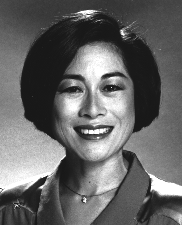Page 15
NOTE: This session was also videotaped, but in the first ten minutes there were technical problems with both the videotape and the audio tape recorder. This transcript reflects two false starts and includes a portion of the interview not recorded on videotape.
[Begin Tape 1, Side A]
Moorhus: Okay, we'd like to start this morning with the University of Washington. You arrived in Seattle in 1967.
Tanabe: Yes, and you're dating me, but that's all right. [Laughter.]
Moorhus: Well, I was already through school in 1967, so—
Tanabe: You don't look the part. We were both ten [years old] when we started college!
Moorhus: That's right. Well, why don't you discuss the University of Washington. You start and I'll ask questions to move us from topic to topic.
Tanabe: Okay. Well, the University of Washington in 1967 was just a wonderful, stimulating place, with wonderful teachers, students who were extremely curious and also involved. Remember that we're talking about the sixties, and this was the age of the—I guess there were many student radicals, anti-war protests, and there was a great deal of discussion on campus about whether U.S. foreign policy was the right thing, and a lot of questioning about the establishment. Keep in mind that I have just come from a very military background, from a military base in which we were constantly supporting the military effort; it was just a way of life. We never questioned. It was duty, it was responsibility, it was for country.
Okay, what happened? [Tape interruption.]
Moorhus: Okay, we're going to re-start [the video]. Tell me about the University of Washington beginning in 1967.
Tanabe: Okay. The University of Washington was a great stimulating place. It had excellent teachers. The students were very, very involved in the community, involved in the issues of the day, and just to set the framework—because many people don't remember what the sixties were like—it was a time of strong feelings against the Vietnam War. The war was at its height. There were many, many protests, rallies, statements against government involvement. This was a real shock to me as a freshman coming into the university system, because I had just come from a very strict military base on Okinawa. It was the staging area for all of the bombing runs to Vietnam. And I came from an atmosphere where, as military dependents, we never questioned. It was all duty, honor, dedication to country, and, therefore, to the war effort.

